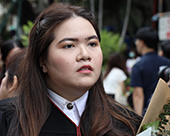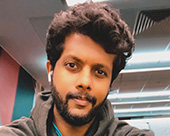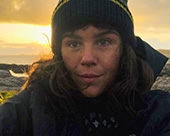Graduates in Focus 2022
View our current Graduates in Focus 2023 | View our Graduates in Focus 2021
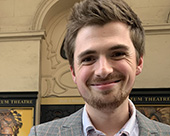 |
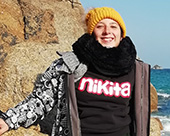 |
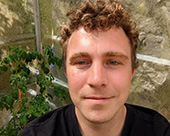 |
 |
|
David Walker-Sünderhauf |
Alice Maestri |
Joe Westley |
Emmanuel Mwesigye MSc Sustainable Development |
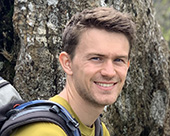 |
|||
| Sututta Srisuwan MSc Renewable Energy Engineering |
Abdalrahman Mohammad MSc Renewable Energy Engineering |
John Francis |
Josh Blannin |
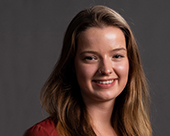 |
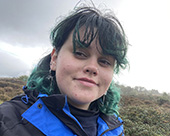 |
 |
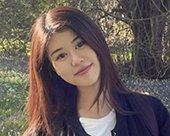 |
|
Jessica Fishburn |
Claudia Malam |
Igazeuma Okoroba |
Ge Guo |
|
|
|||
|
Amber Blundell |
David Walker-Sünderhauf
PhD Student in Medical Studies, University of Exeter (current)
MRes Biological Sciences, University of Exeter
Find out about the new MSc programme in Pathogen Evolution starting September 2022!
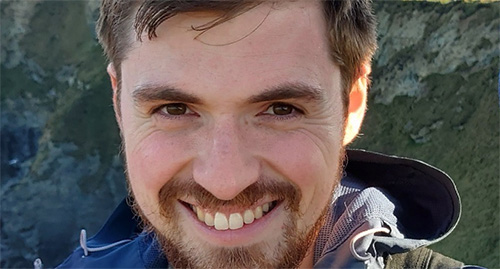
I was an undergraduate in Aberdeen, Scotland studying immunology and knew that I wanted to go into microbiology. I especially found the research into CRISPR-Cas really interesting, at the time it was seen as a new flashy biotechnology but at the Environment and Sustainability Institute (ESI) here in Penryn it is looked at in a much more basic form. CRISPR-Cas is studied in its natural state as a bacterial immune system which suits my immunology background well. The work that is done here perfectly marries that up with ecology and the interactions of different bacteria species and how bacteria live in real life.
When I started my masters here, I found everyone really friendly and welcoming in my lab group and in the wider postgraduate community. When you first start you are given a lot of support on project direction and experimental design as well as who might be suitable to collaborate with. More senior people are available to support at the start and you are coached to become more self-directed and take on ownership of your project as you progress.
I get excited when things that I have been trying to get to work for ages finally work in the lab. I’m starting cloning again at the moment. It is very satisfying when you come into the lab in the morning, and you’ve got bacteria growing on the plate where you really wanted to see them grow.
Pathogen Evolution is an important area of research that draws on many different techniques which can help create a sound foundation for wherever you want to go in microbiology or virology.
Now with Covid, and similar viruses, we don’t need to explain why looking at the evolution of viruses is so important but obviously it goes further than that. Microbiology and bacteria are everywhere they have their own pathogens, their own viruses that can be pathogens and they are constantly in environments where they are exposed to other pathogens so the interactions between them can be so complex and exciting to look at.
Even though my masters was in research I still had some courses that I attended on campus and postgraduate welcome events that I attended. Quite quickly I made friends with people outside my subject area which was great.
I love living in Cornwall I’ve made it my home. When I started here, I founded one of the fundraising societies on campus. Raising funds for a charity in Scotland, called Mary’s Meals, feeding hungry children around the world. We’d put on fundraising events and spent time getting undergraduates involved. Now I’m involved with a non-campus affiliated group called Cornwall Science Community. We’re trying to communicate or bring science closer to members of the public in Cornwall, we organise talks on science carried out in Cornwall, affecting Cornwall, or that are part of Cornish heritage for instance on Humphry Davy the Penzance born Chemist. I find it really rewarding.
Alice Maestri
PhD student in Microbiology, University of Exeter (current)
MSc Environmental Biology, Università degli Studi di Torino, Italy
Find out about the new MSc programme in Pathogen Evolution starting September 2022!
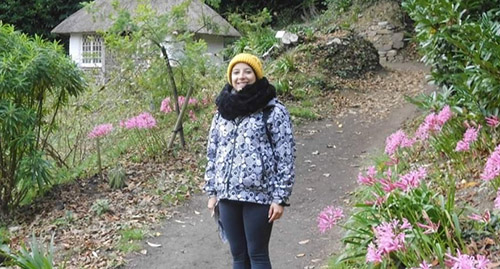
Microbiology is an area of research I am truly passionate about. I did my undergraduate degree in Biological Sciences and an MSc in Environmental Biology, but microbiology is what I am really interested in.
I discovered the University of Exeter, Cornwall programme when I attended a conference as a Masters student in the USA and met Professor Edze Westra, who is working on the evolutionary ecology of host-parasite interactions at the Environment and Sustainability Institute (ESI) here in Penryn. We stayed in touch via emails, and I then applied for a PhD position that became available… so here I am doing my research in Cornwall!
Our department has made a significant contribution to the scientific field of microbial evolution and ecology and continues to be a pioneer in this area of research. I personally love studying here, and the supervisory team is excellent; even though we work hard, the friendly and collaborative environment makes me feel comfortable and welcomed. I often chat about science with other students, and we work together helping one another: this makes me feel part of a community. I believe that feeling part of a group where your ideas are valorised is a key aspect of study experience.
If you are interested in microbes, managing diseases or evolution this is amongst the best places to study. The Masters in Pathogen Evolution would give you a broad overview and grounding in the subject. Microbes and the topic of evolution and ecology are a world in themselves, and I genuinely believe they do deserve study.
At first, I found learning to work independently and designing experiments that fit the broader scope of a project hard. There is a lot of trouble shooting and problem solving involved. I had to learn how to think this way, but in the end the work is very rewarding, especially when you get to see your first results.
One of my best moments was when we were running some experiments that weren’t working as expected (scoop: be aware, this often happens in science!) and we didn’t know why. We then found out that it was because there was an additional system playing a major role that we weren’t aware of. This led to the development of a new research area and the discovery of a completely new and undescribed defence system in bacteria. It is very exciting.
I grew up in towns and cities so living here was very different for me at first, it was much quieter than I was used to. However, soon I started to really appreciate being surrounded by nature and I very much enjoy living in Cornwall now; I wouldn’t like to move back to the frenzy of city life anymore.
The University of Exeter has a lot of support and activities in place for international students and is good at communicating what is available, so I know where to go and who to talk to if I need any help.
Outside of my research I like wild swimming, it is good exercise on its own, plus being in nature is really beneficial for your mental health as well. Practicing outdoor activities has also allowed me to make new friends with people that aren’t students, which is really nice.
Joe Westley
PhD student in Biosciences, University of Exeter (current)
Find out about the new MSc programme in Pathogen Evolution starting September 2022!
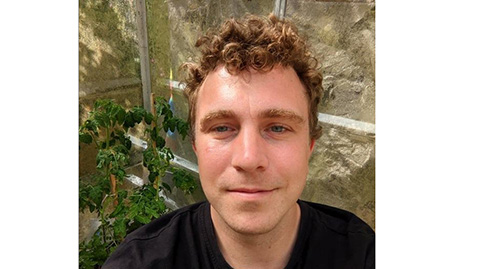
I am a first year PhD student, but I undertook the four-year MSci Zoology programme at the University of Exeter, Cornwall. During my final year I studied Microbial Evolution in the Environment and Sustainability Institute (ESI) and started working with microbial evolutionary ecology, which I have decided to pursue for my PhD.
When I left school at 16, I was interested in further study but as I wasn’t sure exactly what I wanted to study. I was reluctant to go to university for the sake of it so I began working as a chef. When I decided that I wanted to change careers and study biology, I undertook an ‘Access to Science’ course. Doing this course really confirmed my interests in the natural world, and although it was quite a life change, I began my undergraduate degree at the age of 24.
During my Zoology degree I learned a lot about how interactions between organisms can shape evolutionary trajectories. These dynamics really fascinated me, and although I now work with microbial systems rather than animal systems, these broad concepts are highly relevant regardless of whether you are working with vertebrates, bacteria, or viruses.
What was very different, however, was the practical skills involved in the study of microbial systems. Although my master’s thesis was in microbial evolution, I was unable to gain any microbiology lab experience because I couldn’t work in the labs due to COVID-19. I was still able to do the same research project as planned, as a post-doc conducted the lab work for me. I then analysed it and wrote the report. This did mean though, that upon starting my PhD, there was quite a steep learning curve in the labs, but I am fortunate to be in a very supportive and helpful research group. Everyone is more than happy to help and share their knowledge.
I really loved my MSci and current PhD work in the ESI. There is a great atmosphere here in Penryn, it doesn’t feel like a competitive environment, rather a collaborative and friendly one, where people want each other to succeed. You can approach anyone with questions, and they are generally more than happy to help or collaborate with you. Speaking to people at other institutions I get the impression this isn’t always the case.
I was offered a PhD at another quite prestigious university but turned it down, largely due to the testimonies of people that had worked both there and in the ESI. Everyone I spoke to confirmed my suspicions, that the Penryn campus is really a very friendly and collaborative space, rather than a competitive one. I am very happy with my decision to continue my studies in Cornwall.
The ESI actively looks for ways to foster a sense of community and connection outside of lab groups. They have recently started a regular early career researcher microbiology seminar group, to bring all the different microbiology groups at Penryn together. There are normally two talks by PhD students or post-docs, and I think this helps create a space to find out what other people are researching and opens avenues for collaboration.
For my MSci thesis I studied microbial evolution in communities. It was a very exciting project, investigating how the presence of other species influences how bacteria adapt to different temperatures. This project has important implications for how climate change will influence thermal adaptation in important microbial ecosystems. We have made novel discoveries that I am currently writing up with the intention of publishing as a research article.
I don’t graduate until 2025, so I am still a long way off deciding exactly what career path I want to pursue when I finish my PhD. I am going to see what aspects of my research I really enjoy over the next few years, and hopefully this will help me decide. My studies have and will continue to prepare for me quite a diverse range of job roles, though. From continuing a career in academic research, going into a biotech industry position, or using the data analysis techniques a PhD in the life sciences demands for solving other problems, I think I have a lot of options.
Emmanuel Mwesigye
MSc Sustainable Development graduate from Uganda.
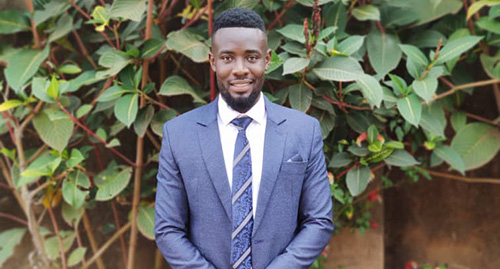
My undergraduate degree was in Environmental Science Technology and Management atKyambogo University in Kampala, the capital of Uganda. This is where I first learnt about environmental management, and it made me want to introduce environmental initiatives to my village. Growing up in Rukungiri, a rural district in Southwestern Uganda, I realised that the community was not conscious about environmental responsibility and this made me want to become an advocate for sustainable development in rural areas.
After my degree, I worked with National Environment Management Authority, as an intern, in the Environmental Monitoring and Compliance department. I then joined the Building Tomorrow Fellowship, where in addition to promoting and advocating for basic education, I championed environmental awareness and literacy programs in rural primary schools within Eastern Uganda.
I got my place on the University of Exeter’s MSc in Sustainable Development through the Commonwealth Shared Scholarship. This course appealed to me because of its breadth of content; the programme included everything I needed to know about, such as environmental policy and governance, and the relationship between nature and wellbeing. Learning about Policy is so important, as the people that set the policies can influence change. The program structure enabled me to further develop my research skills and I also found the transdisciplinarity really appealing, for example, how different issues like poverty and climate change may interact and why you need to work with experts from different fields like health and education to find solutions to problems.
What I really like about MSc Sustainable Development is that it covers how the destruction of our environment affects humanity and what initiatives can be introduced to achieve a specific standard. It’s the bridge between environmental science and how it helps humanity, which is especially important for me, living and working in a developing country.
Because of the Covid pandemic, I couldn’t come to Cornwall to take up my studies, but was able to complete my Masters remotely from Uganda.
My classmates were very helpful and all my professors were amazing and very approachable. I could contact them to ask about anything. It was very easy to schedule person-to-person virtual meetings and ask for help or clarity about specific subjects.
There have been lots of wonderful moments, but one of my highlights was making a podcast with my classmates. I had never created a podcast before but we made it remotely, each of us in different places in the UK and Uganda. It was about ‘Doughnut Economics’, which I had to research to be able to make the podcast. It was posted on the internet and I listen back to it to remind myself of my course.
I also enjoyed the different types of assessment. At university in Uganda our assessments were mainly tests, coursework and exams. On the MSc I had to present a poster, to design a campaign plan and to write a report which I really enjoyed. I was as excited as much I was nervous to be composing my own campaign plan and my poster about environmental hazards. This meant I picked up new software skills too.
I am now volunteering as an environment and sustainability officer with a local NGO in Eastern Uganda called Family Support Initiative. I find this work quite fulfilling as it fits with my career aspirations to work with marginalised communities in Uganda. It is giving me the opportunity to champion several initiatives, for example I have introduced briquette making to replace charcoal as a more renewable source of energy. We make our briquettes from the remains of the maize harvest and other dried-up plantation, which avoids cutting down and burning trees.
I’m also working to provide rural schools with washing facilities. For schools that don’t have access to water, I have introduced tippy taps, which are assembled devices incorporating water-filled jerry cans. The child can step onto the apparatus to wash their hands, which will help prevent some of the disease resulting from poor hygiene and sanitation.
At the same time, I’ve been developing as a social entrepreneur, working with a local innovation hub in Eastern Uganda. I have founded a new start-up programme, which works with young artists from marginalised areas who use music, poetry, drama – any form of art – to address issues related to sustainable development in their communities.
I was recently accepted onto the Mandela Washington Fellowship for young African leaders, to help me further develop as a professional in the field of environmental sustainability but also as a leader in general. The program commences in June 2022.
In the near future, I intend to pursue a PhD along the lines of environmental policy and sustainable development, as well as familiarize with legislative leadership, in a bid to consolidate my advocacy for worthwhile development in rural Uganda.
Sututta Srisuwan
MSc Student studying Renewable Energy Engineering.
Find out more about the MSc Renewable Energy Engineering
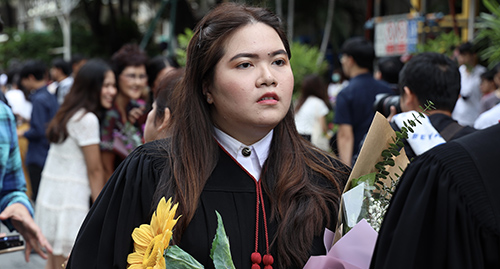
My undergraduate degree was in chemical engineering in Thailand, but I have always been interested in renewable technology and have participated in seminars and study camps on the subject.
I wanted to complete a MSc that expanded my knowledge of renewable energy technology and have always wanted to study abroad. The UK was my first choice and when I looked up University rankings, I found Exeter.
I grew up in Bangkok and wanted to get away from the city, I was looking for a peaceful place to study and thought that, for me, Cornwall was the best place for this. I love being here, the beaches, the walks and living close to nature.
I started study for my MSc online, from Thailand, due to Covid. I was the only student completely studying online so it was very hard especially with the time difference and if there were group projects to be completed. After I had finished my first module, I decided to take a gap year and started on campus in January to complete my course.
I am enjoying everything about the course. It is totally different to how I was learning in Thailand. In Thailand you don’t discuss the topics much in class, the lecturers present and then you take the information away learn it and take the exam. Here the lecturer not only talks but gives us time to think and discuss what we are learning. In addition to class, we do lots of experiments to improve our understanding of renewable energy in the real-world. Through the University we have access to different types of software that allow us to undertake test simulations, there are useful seminars and field trips where we can gain practical experience.
My course mates understand that I had to take a break due to Covid and they are really friendly and helpful. The lecturers recognise that about half of the course is made up of international students, so they adapt their approach to help.
I am living in accommodation on campus and my flat mates have shown me where to go and how to find things. I know where to go for support if I need it and have attended the Intercultural Café a few times. I met another student from Thailand there which was great.
I am taking the MSc in Renewable Energy Engineering because in Thailand we don’t have many skilled professionals in the renewable energy sector, but we do have lots of sunshine. I want to help make Thailand more sustainable and give it a greener future by using the skills and knowledge I have acquired to work in and grow the sector in my home country.
Abdalrahman Mohammad
MEng student studying Renewable Energy Engineering
Find out more about the MSc Renewable Energy Engineering
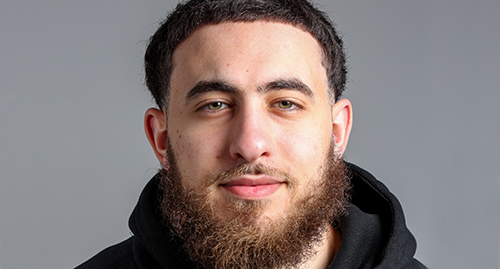
I am in the 4th year of my MEng programme in Renewable Energy Engineering. I originally wanted to go into medicine, but I decided that I preferred Maths and Physics to Biology; so I started looking for an engineering course and found Renewable Energy Engineering. I saw the course as a timely opportunity as there is such an appetite for reducing carbon and creating cleaner green energy now. Engineering is a hard degree with a big workload. You have to learn to juggle 2 or 3 assignments at once and meet multiple deadlines.
I have just finished my industrial placement project on Aerogel glazing in advanced window technology. Buildings contribute to a large amount of energy consumption and one of the weakest elements is windows. I looked at how I could make a window more energy efficient by using Aerogel in the gap between a double-glazing unit. I analysed the thermal and light characteristics and compared them with a standard double-glazed window in the UK. The results were really good and the reduction in energy consumption was significant. The thing I love about a project like this is that you can see the difference it would make in the real world.
The supervisor for my project is an expert in advance window technology so he was very supportive. All the lecturers have their own area of expertise and a renewable energy background. I’m glad I was able to work with them and will be able to use what I learnt in their modules in my own career.
Living on Penryn Campus was quite a change for me and a big cultural shift. I was born and raised in London and had never even visited Cornwall before I arrived on campus. It was rare to find someone from my background but stepping out of my comfort zone has really helped me. I wouldn’t have matured the way I have if I hadn’t had to learn to live independently.
I am Muslim and eat Halal food. When I first arrived I had to follow a vegetarian or pescatarian diet for a while, but it is getting better, I can now find something Halal in the Stannary and Koofi. There were other Muslims I met who helped me including finding the nearest Mosque which is quite difficult to get to.
The University have been very helpful in terms of making modifications for religious duties along with the Multifaith Chaplaincy who were also very supportive. They recognised the need to make changes and now new students don’t experience the same challenges we did. Now it’s much easier to find a place to pray collectively for Friday Prayer.
In the short term I would like to become a Chartered Engineer and then long term I would like to work in the Middle East either in the solar sector or on low carbon buildings. The great thing about Renewable Energy Engineering is that there are a variety of opportunities available after graduation.
John Francis
MSc Student studying Applied Data Science (Environment & Sustainability)
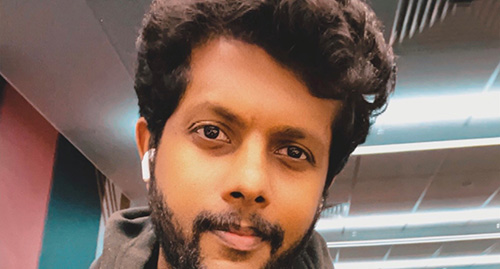
First off, please give us a bit of background about what made you choose to study with us at the University of Exeter in Cornwall?
When I decided to do my masters in the UK, my priorities were to do it at a top Russel group institution and at a place which was unique and far from the city rush. At the Penryn campus I have both, and the beautiful beaches are only a stone's throw - which was a bonus.
We’re glad you had such great opportunities! What did you enjoy most about studying in Penryn?
It is a beautiful campus with very helpful faculties and state of the art facilities. I could access the computation facilities anytime on campus and off campus by using my credentials. It’s perfectly safe in the campus even at the late hours.
Can you give any advice for students who might want to pursue a similar career?
Be ready to work hard and put in a lot of work. Be passionate about what you want to do. Data Science is a very dynamic and an ever-evolving field. The possibilities are infinite so make sure to utilise them.
Finally, do you have any advice for anyone thinking of applying to any of our programmes in Applied Data Science at the University of Exeter?
Understand the depth of the modules you are going to take and come prepared. The course directors and faculties are always there to guide you, use them to the maximum.
Josh Blannin
MSc Student studying Applied Data Science and Modelling
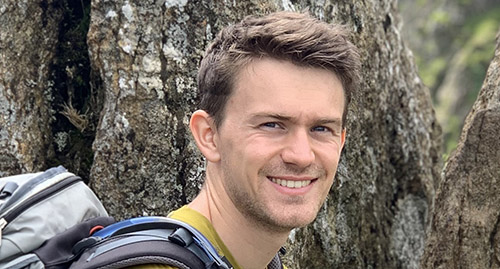
First off, please give us a bit of background about what made you choose to study with us at the University of Exeter in Cornwall?
My background is an MSc in Physics and I worked for about a year at the Science Museum in London. I became increasing interested in coding, statistics, and machine learning, and eventually decided I would return to studying. I chose the University of Exeter because they offered an Applied Data Science course, which covered topics I was keen to learn more about. The Penryn campus has good links with the ESI and lots of environmental research which made Cornwall very appealing as I hope to use what I’ve learned for the purposes of environmental monitoring and solutions.
So what did you enjoy most about studying methods to understand data and modelling tools for solving challenges?
I found it fascinating to learn how broad the field is. There are many different statistical tools and modelling types available to solve complex problems. It has also been great to work with varying data types – measurements, surveys, images, etc – as information can be gained from so many different sources.
Finally, do you have any advice for anyone thinking of applying to any of our programmes in Applied Data Science at the University of Exeter?
Be prepared to do some maths (it underpins at lot of data science and modelling) and some familiarity with coding can help. Additionally, having a field that you’re interested in applying these skills to, will make it even more motivating, because then the methods and results both become interesting to you personally.
Jessica Fishburn
MRes Sustainable Futures graduate from the UK (2021)
Currently studying a PhD in Finland.
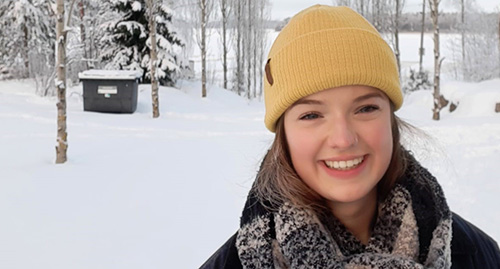
I originally grew up in Surrey just outside of London. I wasn’t always sure that I’d want to go to University, but while studying GCSEs and A Levels I looked into it more.
After coming down to Cornwall to visit, find out more and speak with programme directors I just thought ‘wow, it’s so nice down here’ and was impressed with how friendly and passionate the people running the course were.
So, I ended up studying a BSc in Business for three years in Penryn, with a lot of focus on sustainability as I’d always enjoyed studying this and learning about the environment. I really loved it, and this led me onto staying to study a Masters in Sustainable Futures.
It really suited me as I’ve always been quite a shy person so the fact it was a smaller campus with smaller classes made it easier, and there’s still lots of student activities going on. Of course, there’s so much outdoors space and the beaches, who doesn’t love that? And perfect for the course too really.
Typically, I got into surfing, I’m awful at surfing but I just love it. I joined a women’s surf club and was also part of the horse-riding society while an undergraduate, so that was great. Having a car also allowed me to explore more of the area, Kynance Cove is my favourite place, as well as St Agnes, St Ives and Penzance – actually every part of Cornwall is so nice!
On my MRes we were encouraged to network with local companies and this was so enjoyable and rewarding, especially working with Cornish businesses.
I really enjoyed working with social enterprises and charities, it was really interesting to get to know local companies, help support them and do something where you can actually see you make a difference.
One of the biggest challenges was that [because of starting a MRes during the pandemic] pretty much all of the course was delivered online. So, you had to have enough self-discipline and motivation to carry on with everything whilst this crazy stuff was going on in the world.
But I was really lucky in the respect that people I’d met on the course, and friends from undergraduate as well, were so supportive and we were able to be there for each other.
The course leaders were also very supportive of us and kept in contact to check in between pre-recorded and live lectures. My lecturers and professors were probably the best thing about my university experience as they were just genuinely very caring of you, and with the smaller class sizes they knew everyone personally.
Also, the quality of the course was really good, even though it was taught online, and you could struggle to get the same kind of experience as in person. It was just a different experience, but in terms of the research methods that were taught it was really good and I got a lot out of it.
Something I have advised people on since is the funding for the Masters.
In order to cover my tuition and living costs I took out the maximum postgraduate loan, worked part-time at a restaurant, and I also received a grant from my previous supervisor to provide administrative support on developing a Handbook for Circular Economy - which I was very grateful for not only for the financial support but the experience of putting together a book manuscript.
It was extremely difficult to balance all of these responsibilities, especially on a full-time programme, but I am a particularly determined person, and this is something I really wanted to do, so I made it work.
Essentially, that is the advice I offer to others, it is not easy but if you really want it there are always ways to make things work and be proactive in finding support.
I was offered a brilliant opportunity to work on an EU Horizon 2020 project with lots of international mobility and industry experience while studying for my PhD at LUT University in Finland.
I’m still in touch with a lot of the lecturers in Penryn now actually, even the ones that I didn’t get to work with. Their support and the research techniques I learnt on the course have been really helpful while I’ve been out here.
It’s funny as all my friends and family knew how much I loved Cornwall and were shocked that I left, but I’ll definitely be back and am looking forward to my two graduations later in 2022!
As for the future, I think I’d like to stay in academia, but closely connected to industry, and continue to research sustainability in business in hopes to make impact with my work.
---------
Please note that Jessica studied her Masters’ during the Covid-19 pandemic when the teaching was online, currently the majority of this course is taught face to face.
Claudia Malam
MSc student studying Mining Environmental Management
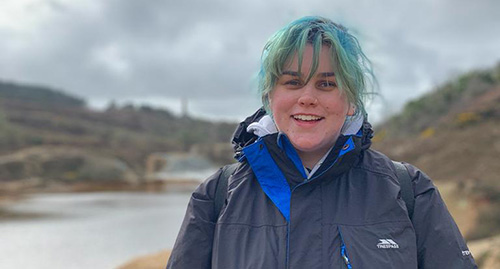
I have always been interested in science of some sort, and now with climate change and the introduction of new technologies (like electric vehicles) I realised I wanted to be part of the process of making the world more sustainable. I have a geology background - I did BSc Applied Geology at Plymouth - and I feel that with mining the only way to improve sustainability is from within industry itself.
The MSc Mining Environment Management course appealed to me because it is multidisciplinary; it includes all aspects of mining, like environmental science, politics, economics, etc. It was interesting coming into it as a geologist as I had quite a narrow view, so it has really broadened my knowledge. I didn’t know much about the mining industry itself, so I’ve learnt a lot but have had to work very hard. We learn about physical contamination of sites, remediation, but also a lot of social science. My research project for example, is looking at the social sustainability of bauxite mining in Guinea.
Another huge draw was the fact that the course sits within both the Camborne School of Mines (CSM) and the Environment and Sustainability Institute (ESI), so you do get the best of both. Especially when looking at the reputation of the two.
My favourite part of the course so far has been the Politics, Mining and Sustainable Development module, which is looking at how companies and governments interact regarding the mining industry. It covers topics like corporate social responsibility, social licencing for mining, and how to properly communicate with local populations being affected by mining. This is so important, as it is often these communities that have been left the most vulnerable. Protecting the rights of these people has become my main area of interest.
One thing that I have found challenging is the sheer amount of work - sometimes the submission deadlines for coursework sat quite close together. Being able to manage this side of things alone is preparing me for the real world and working in the mining industry.
I’ve had a lot of support from my lecturers and found the EM3 panel thought-provoking and helpful. EM3 (Environment, Metals, Microbes and Minerals) is a group made up of PhD students, lecturers, researchers and masters students specifically from within CSM and ESI. We meet every week, and it provides everyone with the opportunity to present or discuss their research with those from different areas of the industry. Getting to know everyone has been fantastic.
My course mates come from a variety of international backgrounds, and some have worked in industry, I’ve learnt a lot from them. Some of our modules are shared with other CSM courses, such as Exploration Geology and Mining Geology, so you are learning alongside people from a variety of disciplines. And when the classes are just for my course, we’re a small, close knit group getting to discuss real world issues and understand each other’s opinions.
To be studying this course in Cornwall is of huge value because of the mining history and heritage. There are a lot of historic sites that have been preserved and turned into World Heritage Sites, which we have visited and learned about. The Cornish landscape is full of reminders of the mark mining has made, and the local people are able to tell you how they feel about it and the impact it has had on their environment, so we gain a better understanding of the social effects, as well as the physical. The course is quite hands-on; we have carried out geochemical and geophysical analysis at old mine sites and visited a site which is still under remediation, for which we discussed potential options.
And living in Cornwall is just so easy going, there’s a nice pace to it. From my flat down Falmouth High Street, the beach is only a ten-minute walk, and I try and go sea swimming twice a week if I have time. I live with a great group of people and have got involved with the Students’ Union as a course rep and as part of the Violence Against Women and Girls group.
When I graduate, I’d like to work in the social impact assessment side of things, preferably with Indigenous communities around the world. I want to travel and work with these communities to mitigate and reduce the impacts that mining has on them. One day I’d like to do a PhD, but I feel that it’s important to work in the industry and gain experience for a few years first.
Igazeuama Okoroba
MSc Sustainable Development graduate from Nigeria
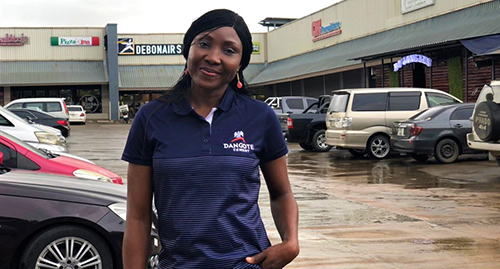
Today there is a growing awareness of sustainable development in business in Africa but when I decided to undertake the MSc at University of Exeter, Cornwall in 2009 it felt like a bold step. I was not aware of any Nigerian University offering the course.
I chose the Sustainable Development MSc as it was multi-disciplinary. Human geography interwoven with economics, social and political issues, it wasn’t just about business or management. I was particularly interested in an MSc rather than an MA.
After graduating from the Rivers State University of Science and Technology in Nigeria I became interested in Social Sciences and Health, Safety and Environment (HSE). I decided to quit my job and become a full-time Masters’ student for a year.
I was considered a mature student and with the support of my family, I was able to leave my children (who were toddlers at the time) to study in a place that was very different to home.
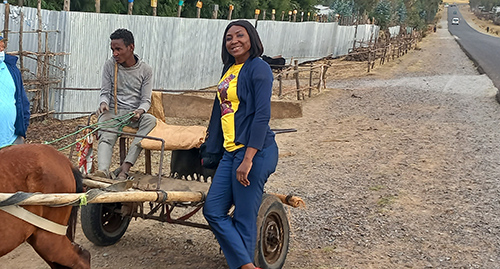
I wanted to experience British culture, but it was quite shocking at first as I was the only black person in my class and even when I went into town (Falmouth) I would see a sea of white people. However, I adapted really quickly and got to know other Nigerians on different courses.
My class liked the diversity I brought to the course, they were very friendly and warm and were interested in hearing my developing world perspective. Hearing first hand from someone who lived and worked in Nigeria’s Niger Delta I think they found my perspective interesting and valued the contributions. I had been working in the oil and gas industry which is not an industry that is viewed well in Africa with its record of pollution and human rights issues.
Studying in the UK was very different to studying in Nigeria. It was easier because lectures were interactive and most of the time, in sustainable development, the answers to our questions weren’t from a pre-set mindset. You were encouraged to give your opinion based on the principles of your course. I would receive feedback on the work I did, which was different. Initially I wanted to know what the lecturer wanted me to say until I got used to the idea that they were going to pay attention to what I wanted to say and test my knowledge. It developed my confidence in my views and how I supported them with my knowledge and understanding.
The most challenging part of the course was academic writing. I had some experience of writing for the media and undergraduate writing, but Exeter was my first experience of academic writing. You have to consider different sources of literature, analyse it and validate what you’re writing. It was a vigorous approach which took time to learn. The resources in the library were very useful for looking at the ways other people wrote so I could develop my own style. I used the library a lot.
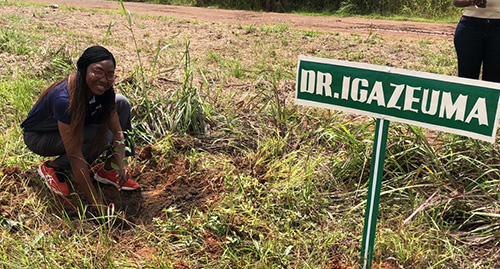
My favourite thing was the presentations that we had on the course sustainable perspectives. We presented term papers and the topics were always very engaging, people would talk about things that meant a lot to them like GM foods and cycling. My interests were around topics like social cohesion and gated communities. The lecturers would encourage you to challenge the way you thought about the topic and not accept what you initially understood the subject to be.
While I was still at Exeter my previous company contacted me to say they now had a Sustainable Development department and invited me to join it.
I started a new contract as a Regional Development officer in the Sustainable Development division. It was very gratifying to see that my MSc was being recognised. Since then, my career has been in sustainable development. I am now Head of Sustainability for Dangote Cement, which has operations across ten countries in Africa. My previous roles focused on sustainable development as part of corporate social responsibility but now I am involved in the integration of Environmental, Social and Governance (ESG) in business operations. My team looks for ways to improve our ESG impact. The job cuts across all functions of the company, creating strategy that influences the whole value chain to help us improve on our ESG performance.
What I have studied has enabled me to build my capacity for problem solving and innovation. I have to understand different aspects of an organisation and act as a change agent to persuade people to work in ways that benefit the business and society.
I count myself as very privileged that I took the Masters’ before there was as much awareness of sustainability as there is now. There is a demand for people to work in this field and I still find it difficult to recruit people with the right knowledge and skills to my team.
Ge Guo
MSc Student studying Applied Data Science and Modelling
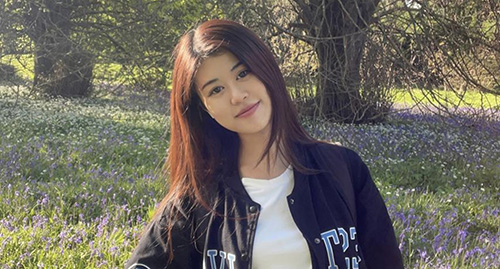
I graduated in China with a Bachelor's degree in Accounting. I was interested in Data Processing and Analytical Modelling, so I had no hesitation in choosing a Master's degree in Data Science and Modelling, which was totally different from my Bachelor's degree. In addition, I wanted to experience a different academic environment by studying in a new country. I was very impressed by the University of Exeter's ranking and its location. This was my first choice, and I was lucky to eventually get a place here.
Initially I found the decision of changing my major to be quite distressing, as I didn't have any idea how to start. However, once I successfully built my first model (with guidance from my tutor and classmates), it helped me build my confidence and at the same time, develop my interest.
I enjoyed everything about this course. It was very different from the style of studying I was used to in China. What impressed me the most was the group work, something which is rarely experienced in China. We all work together to complete and then demonstrate the project. Bouncing ideas and helping each other in the group, gives a clearer comprehension of the course.
Finally, like me, if you want the challenge of changing your professional direction, make sure you familiarise yourself well in advance with some of the Mathematics and Computing that is fundamental to Data Science and Modelling. The initial days of not being able to write code can be really stressful. Getting familiar with it in advance will help you increase your motivation and interest.
I'm grateful to the University of Exeter for providing so much support and activities for international students. Looking back at my time spent here, it will be with warmth, as I always found assistance when needed and that will be the most memorable part of my studies here.
Amber Blundell
MSc Sustainable Development graduate
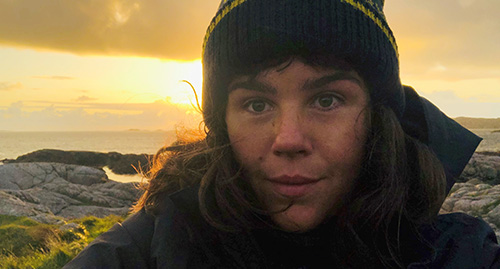
Before starting the University of Exeter, Cornwall MSc in Sustainable Development, I had been working in publishing in London. I have always been interested in geography but had never really pursued it, which I regretted. I found myself having more and more conversations around climate change and had a growing desire to go back into learning and learn more about this topic and its impact.
This led me to scope out different courses and the one at Exeter really piqued my interest. The research was excellent, and it was world renowned for its work, particularly in the geography department. The breadth of the course subjects and backgrounds of lecturers made it a really holistic course. Living in Cornwall also appealed to me.
I came to the course with very little contextual knowledge of the field and found it quite difficult to start with; it highlighted that discord between communication and science and how that is brought into mainstream media, which I continue to find really interesting.
I wasn’t the only person that didn’t have a science or a geography background. The lecturers were incredible and very supportive and welcoming. The course and the content enable you to confidently self-learn whilst giving you the information and level of detail you need to step up and fully participate, and I felt totally supported.
I undertook the Master’s on a part-time basis over two years and continued to work in publishing in London for the rest of the time. I’d really missed learning and embraced the opportunity the course provided, I could work very flexibly and from home in my publishing role with six-weekly visits to London, being able to support my study like this for the first year was incredibly helpful.
I would say to anyone thinking about doing the course, visit the campus and where you are going to be living and, if you can, set up a meeting or call with the course convener to get an insight into how the course will be run and what the expectations are. The information on the website is comprehensive but I found the lecturers are very receptive to those kinds of conversations. Part-time learners are often in the minority so don’t be afraid to reach out and ask all the questions you need to.
I discovered that there was a very collaborative and supportive ecosystem of people around me and it was great to extend that over two years and have my sphere of colleagues and friends expand.
I found learning the different styles of assignments quite challenging. I’d come from a degree where there was a lot of critical thinking and analysis, but it was mainly essays and therefore one style of work. On this course each module had its own requirements, and that was great because it challenged you to think about your presentation style, the voice and tone of your writing and seek out sources that would give you inspiration and act as a template for doing the work. It helped me get a broader spectrum of styles under my belt.
One of the highlights for me was working on an assessment related to Cornwall Council’s climate emergency plan, which had recently launched. It was a very collaborative, constantly evolving piece of work. We met with the council, which helped give a real-world context and it allowed us to see how our work could be applied beyond the course.
I now work for the Natural Environment Research Council (NERC) as a Programme Manager. Their remit is to invest public money in world leading science. It is designed to help the public sustain and benefit from natural resources as well as to predict and respond to natural hazards and understand environmental change. I manage several Green Finance Initiatives, including the Climate and Environmental Risk Analytics for Resilient Finance (CERAF) and Nature Finance programmes.
What I learnt on the Master’s is directly contributing to what I am doing now. The course also gave me a kickstart in improving my soft skills: communication, time management, working independently, working in an interdisciplinary and collaborative way, and approaches to problem solving complex issues are all skills I use on a regular basis.

